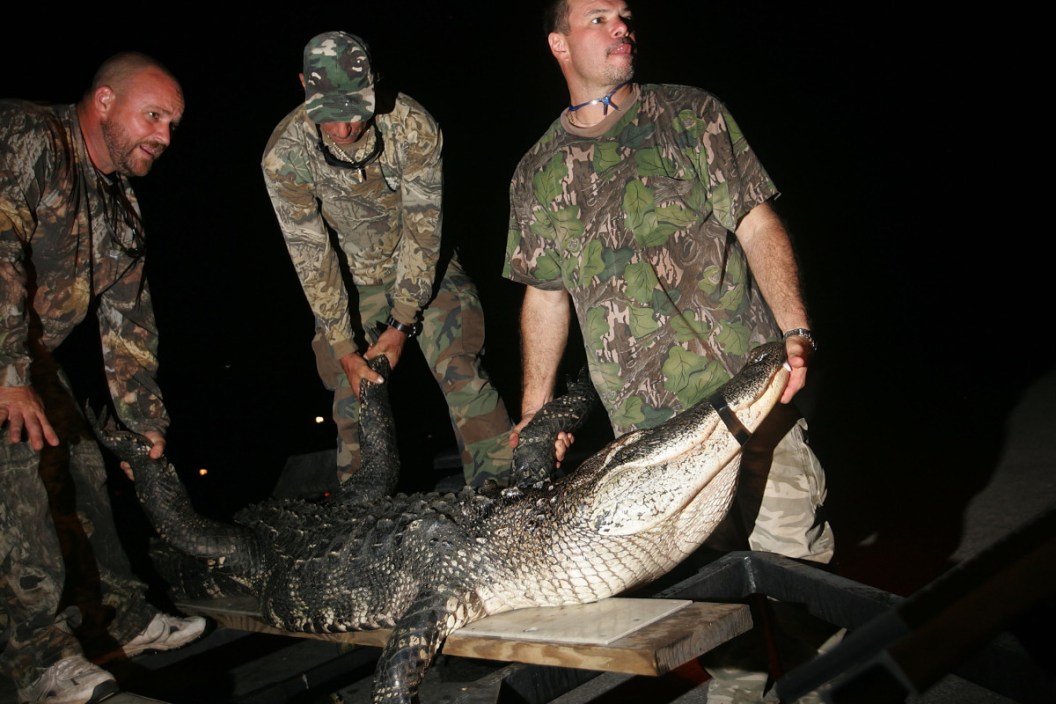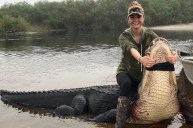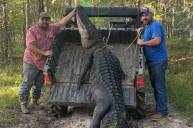If you're feeling adventurous this year and want to try hunting for something different in the outdoors this year, the American alligator may be just the challenge you're looking for. Alligator hunting season brings about a whole new set of challenges that are drastically different than hunting a deer or turkey in the woods. Unlike other forms of hunting, alligator hunting is best enjoyed in groups. In truth, there's a bit of a large learning curve to pursuing these big reptiles. It helps if you go with someone who's harvested alligators in the past.
You'll find that once you've successfully harvested one of these dinosaurs, you'll probably be left wanting to try it again. These reptiles yield a lot of meat that's much tastier than you might think for a creature that spends most of its time in dirty, swampy water. Today we'll give you some general information to get started on your own alligator hunt. With alligator populations thriving across much of the United States, state wildlife agencies need all the help they can get controlling the population.
How to Hunt alligators
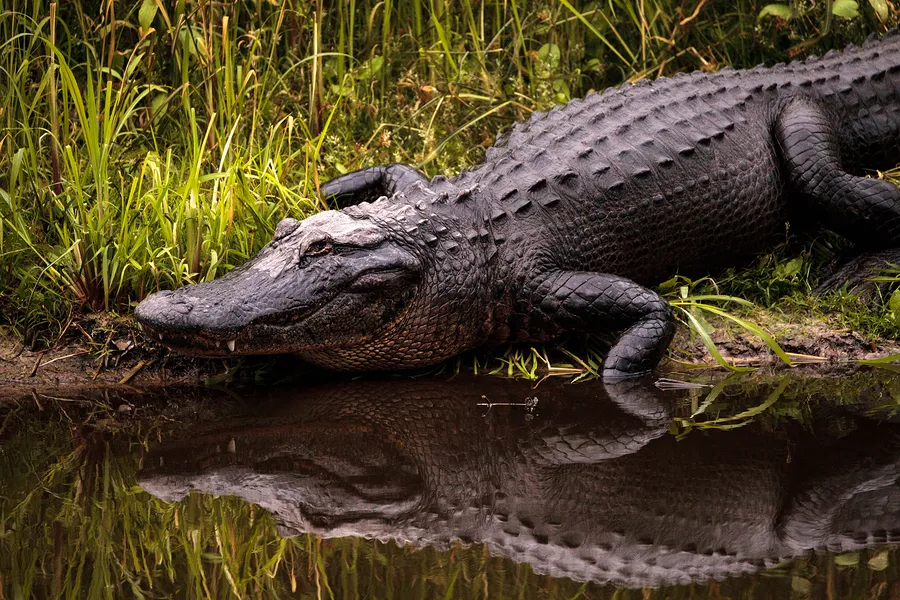
One of the most popular methods of alligator hunting is the hook and line setup. It's exactly what it sounds like. Depending on the state, the method is to either leave a setup overnight like you might use jug or trotline fishing. Some hunters fish for them conventionally them via rod and reel. Texas allows you to suspend a bait just above the water overnight, and then return to it the next day.
In Florida, alligator hunters using bait are not allowed to use hooks. Instead, you must use a technique known as "the wooden peg method" where you wrap a wooden peg in bait. Florida Fish and Wildlife recommends a two-inch section of broomstick handle. When the gator swallows the bait, the peg gets stuck in the back of their mouth and allows you to play the animal.
Some people prefer to use a snatch hook either attached to a fishing rod, or just a simple hand line of some kind to cast at and snag a gator in open water. Another popular method is to attach a restraining line to a gator. This is sometimes done with archery gear, but a harpoon is one of the most popular methods. Attached to the harpoon in a length of line that is usually connected to a float of some kind. With either method the principle is the same, you either play them or let the gator tire himself out fighting.
The most important part of the hunt is dispatching the animal quickly and humanely once you get it close. Some states, like Louisiana, allow you to use rifles, handguns, or archery equipment. Florida, on the other hand, doesn't allow the use of conventional firearms. Only archery gear, knives or specialty-made "bang sticks."
Bang sticks are just what they sound like. It's a long pole with a mechanism attached to the end called a powerhead. The powerhead is loaded up with a single firearm round. Popular calibers include .44 Magnum, .357, .223 and .410 slugs. Once loaded, you get the gator to the side of the boat and then quickly jab the animal in the back of the head with the bang stick. The stick quickly and safely fires the single round through the animal's head, killing it quickly and humanely.
Keep in mind that once you dispatch the alligator, you aren't done. These reptiles are surprisingly resilient and many a hunter has been surprised by a "dead" alligator that suddenly seems to come back to life. That's why most seasoned alligator hunters tape the animal's mouth shut immediately, even after being shot. Just in case. Some hunters prefer to sever the animal's spinal column right behind the head and then pierce the brain with a knife to make sure the animal is truly dead.
Spot-and-stalking is also an option in some states. But you need to be careful with these if the animal is in the water. Usually only a small portion of the head is visible There's always the possibility of a ricochet off the water's surface if you miss. For that reason, it might be best to restrict this type of hunting to private lands where others aren't around. Retrieval is a bit more problematic on spot-and-stalks. You'll need heavy snatch hooks to snag and bring the body to the surface. If you're worried about losing an animal, we'd recommend the more traditional methods.
Whatever method you choose, make sure it is legal according to your chosen state's alligator harvest program. Go over the application process carefully and make sure everyone in your hunting party is properly registered. In some cases, everyone one the boat may need to be a permit holder while other states allow others to help one license holder on their hunt. Also make sure you pay attention to boating regulations regarding transport of firearms if you are using them.
Alligator Hunting Season in Florida
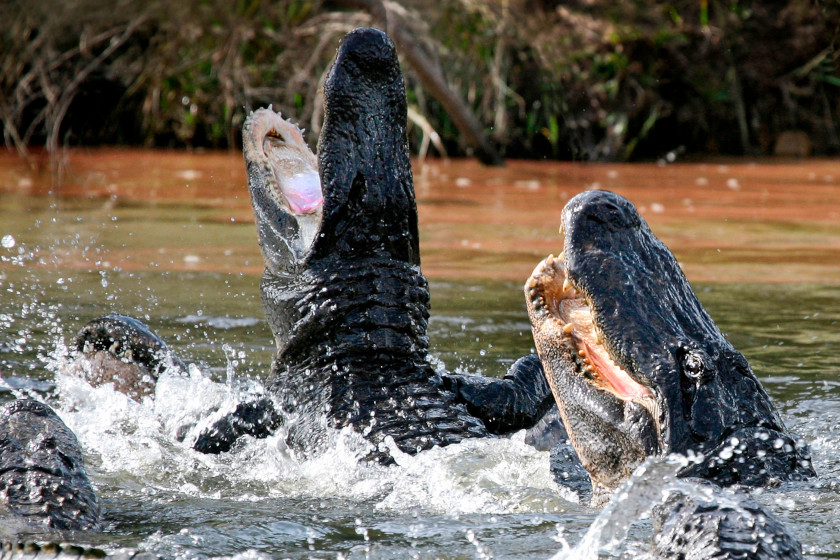
markrhiggins via Getty Images
There are few stories of conservation success that can rival the alligator. Back in 1973, the American alligator found itself on the endangered species list. It was removed again only 14 years later. In Florida, the Florida Fish and Wildlife Commission estimates there are 1.3 million gators lurking in the state's lakes, streams, ponds and swamps.
Currently the state allows hunting in 65 of 67 counties. You do have to apply for these permits. There are several phases of application from Phase I in mid May to Phase IV from late June onwards. Phase IV is considered the leftover phase, and alligator hunting permits are sold until they are gone.
Florida is the most expensive place to hunt gators. Licenses for alligator hunting in Florida are $272 for residents and $1,022 for non-residents. If you have a "Persons with Disabilities Hunting and Fishing License" there's good news, the license/permit will only cost you $22. Once you have an alligator hunting license, additional permits cost $62 each. You are allowed a bag limit of two gators per designated hunting zone.
In 2022, Florida's alligator hunting season runs from August 15 to November 1. Hunting hours for alligators in Florida run from 5:00 p.m. to 10:00 a.m., so you'll want to buy some good headlamps and be ready for a long but thrilling night. If you've never gone gator hunting before, we recommend hiring a guide to take you out. Though statewide alligator harvest success rates are good, it's worth it to have an expert there to help.
Spears, spearguns, harpoons, gigs, bows and crossbows are all legal weapons according to the FWC. The only firearms allowed are bang sticks. Hunters can also use snares, snatch hooks, hand-held catch poles, baited wooden pegs, and fishing poles with baited wooden pegs, artificial lures or weighted treble hooks.
Alligator Hunting Season in Louisiana
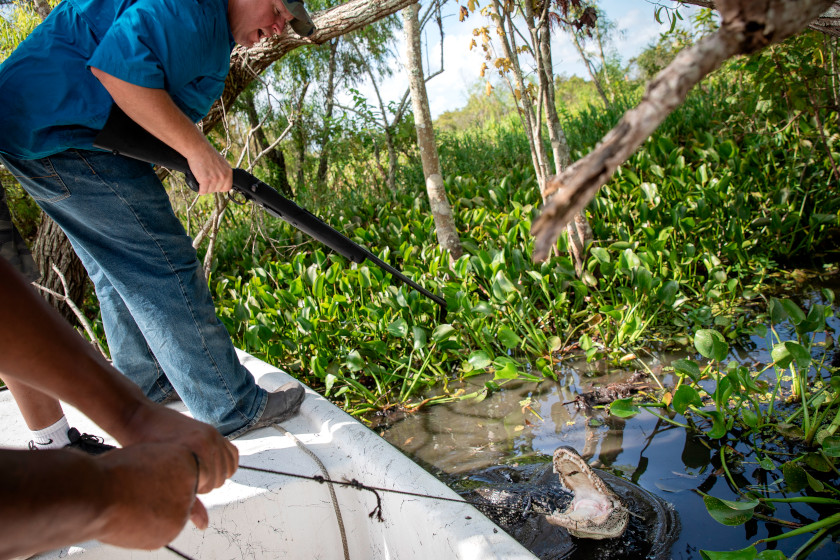
Drew Angerer via Getty Images
The Magnolia State offers a lot of leeway in terms of hunting regulations for alligators. You can use archery gear, hook and line and firearms. The only exception is shotguns, which aren't allowed. But it is legal to shoot a swimming alligator if you so choose to try it.
The cost of hunting gators in Louisiana is a little less expensive than some other states. A resident's license is $25, and a non-resident license is $150. The downside may be finding a spot to hunt. Louisiana Wildlife and Fisheries (LDWF) issues alligator tags "for private lands containing sufficient wetland habitat capable of supporting an alligator harvest." You need to submit a map of the area you want to hunt, proof of property ownership, hunting lease details, or a homeowner's signature indicating permission to hunt with an application.
The LDWF also holds a lottery for public lands and lakes which opens opportunities for 400 hunters a year to pursue alligators on over 40 pieces of public land. You can apply for these tags in mid-May every year. There's also the possibility to hunt "bid" areas being offered by local and federal government agencies. The downside to these is you are effectively bidding against other hunters for the opportunities they offer.
Louisiana has split their state down the middle into zones when it comes to alligator hunting, and the dates fluctuate each year. Open season for the east zone starts on the last Wednesday of August and runs for 60 days after that. In similar fashion, the west zone opens the first Wednesday of September and runs for 60 days.
It is worth noting that alligator season in the Magnolia State is a strictly daytime-only affair. While you are allowed to leave baited hooks out overnight, you are NOT allowed to harvest alligators after dark.
Alligator Hunting Season in Georgia
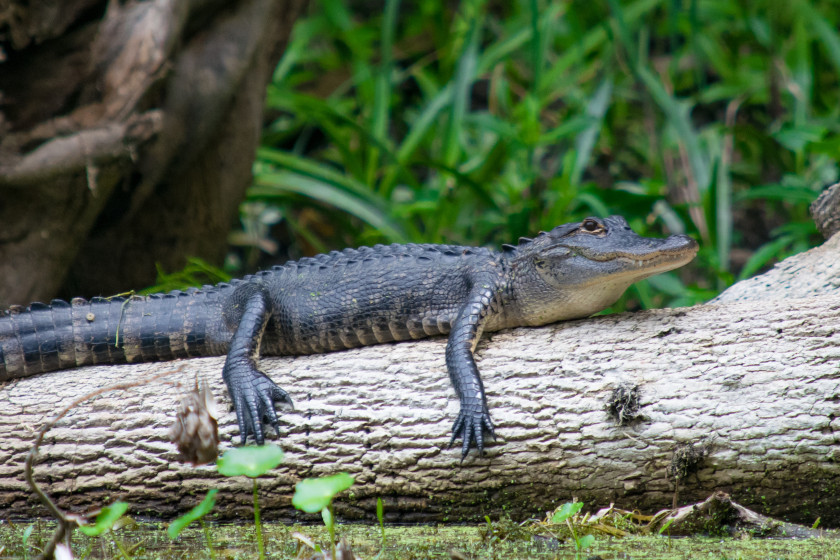
Michael Warren via Getty Images
Georgia doesn't get a lot of attention for alligator hunting. However, there are approximately 250,000 of these ancient reptiles living in the Peach State according to the Georgia Department of Natural Resources. You do have to apply for a drawing to hunt here. The deadline for applications is July 15. This is a state that requires an alligator be captured and secured via a restraining line before being dispatched. Like Florida, they don't allow the use of baited hooks, but you can use snatch hooks and wire snares to snag a big gator. For dispatching the animal, it's handguns, bang sticks and archery gear only.
For hunters fortunate enough to draw a tag, the state hold some giants. A 14-footer weighing over 700 pounds was taken there in 2019.
The 2022 season opens at sunset on Friday, August 19 and closes at sunrise on October 3. Hunters are allowed a bag limit of one alligator and depending on the zone, it must meet a certain size restriction. For most of the zones the size limit is 48 inches, but for Zone 1A, alligators must be at least 96 inches. Hunting hours for gators in Georgia are wide open, day or night, meaning you can hunt whenever it fits your schedule!
You will need a Georgia hunting license and an alligator harvest permit. Hunting licenses are $15 for residents and $100 for non-residents. Permits are $75 for residents and $250 for non-residents.
Alligator Hunting in Alabama

scgerding via Getty Images
Alabama is a little different than some other states when it comes to gator hunting. It's also a draw-only hunt. The registration for that closes in July. Like many other states, hunters are allowed only one gator per year. The Yellowhammer state does allow younger hunters 16 and up to take part, which isn't always an option for the other states.
In similar fashion to other states, you must get a restraining line on the gator before it is dispatched. The difference here is hunters are limited to bang sticks .38 caliber or larger or shotguns. Alabama regulations dictate you can use shot no larger than #4.
Alabama also has a mandatory training course on alligator hunting that must be completed online before the state will accept your hunter status. The videos with the training course are a worthy watch even if you don't end up hunting Alabama. We appreciate the Alabama Department of Conservation and Resources taking the time to put them together.
Permit numbers are greatly limited in Alabama and depending on where your permit is, the season will vary greatly. But hours are always sunset to sunrise. The only exception is the highly coveted draw area in the Lake Eufaula zone. It allows hunting during both day and night. However, it doles out only 20 permits a year. For successful applicants in Lake Eufaula, we should note this is the only zone in Alabama with a size limit, and that limit is eight feet.
Alligator Hunting in Mississippi
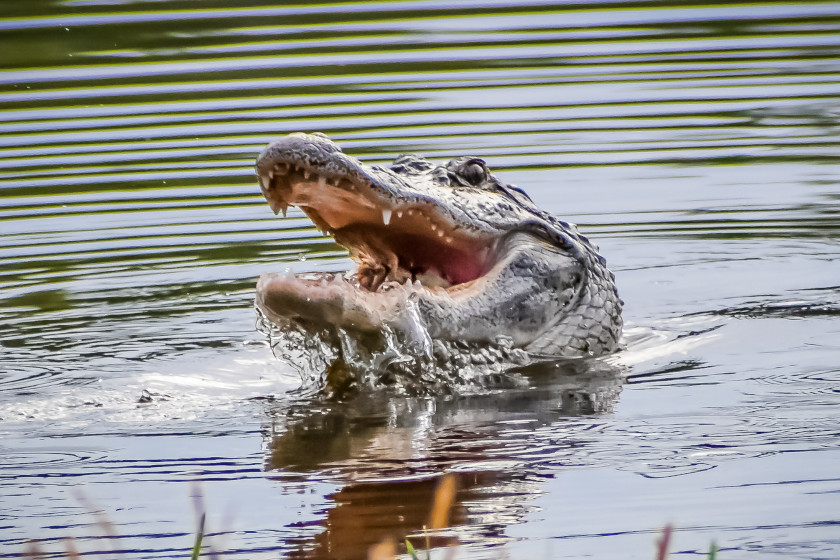
Jamie Tuchman via Getty Images
Mississippi doesn't dole out a huge number of permits for gator hunting, but there are still some giants to be found there. The state only allows snatch hooks, snares, harpoons and bowfishing equipment. The use of baited hooks is not legal.
For dispatching gators, only bangsticks and shotguns are legal. To hunt gators in Mississippi you will need an alligator hunting license, which costs $25 and a possession permit. These permits cost $200. The drawing for these permits happens in mid-summer like many other states.
Mississippi has a size limit of at least four feet for alligators and you are allowed two a season, however only one gator can exceed the seven-foot mark. We can appreciate a state that keeps their season dates simple and to the point. Mississippi's alligator season runs from August 26 to September 5 for public lands and August 26 to September 19 for private lands. They haven't really changed them much from year-to-year like other states either, so you can begin preparations further in advance.
Alligator Hunting in South Carolina
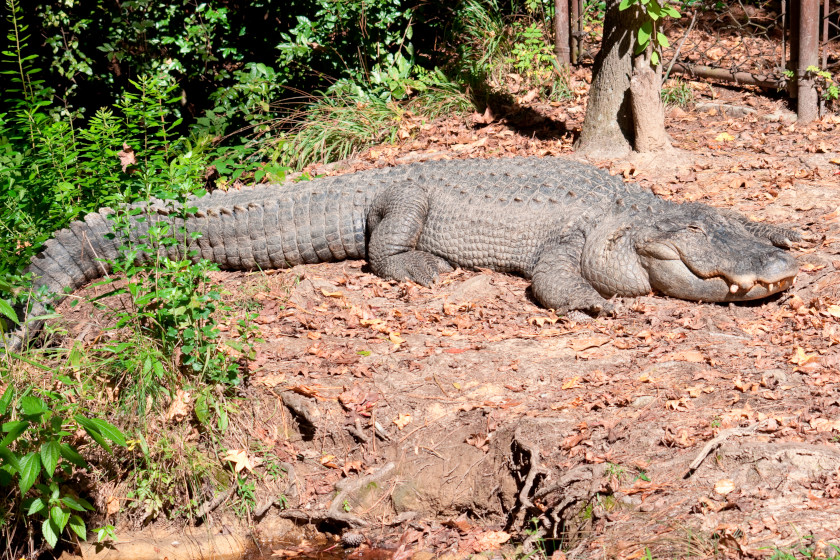
brookebecker via Getty Images
The Palmetto State isn't typically a state one thinks of for gator hunting. It is a much tougher state to get a permit for, but the good news is that through multiple applications you can build preference points to increase your odds of getting one in the future. It's kind of like elk permits for many other states, only for giant, prehistoric reptiles!
You will need a South Carolina hunting license and it's an additional $100 for an alligator permit. Non-residents also need to pay a non-resident fee of $200 in addition to those costs.
Carolina's legal methods of take are simple. Secure the animal via restraining line and dispatch via handgun or bangstick. South Carolina does not allow the use of baited hooks.
Another relatively simple season to remember, South Carolina's alligator hunting runs in two sections. From noon September 10 to noon October 8, 2022. It varies very little from year to year from that, usually starting and ending only a day or two earlier at most. The bag limit is one animal per permit. It's worth noting that neighboring North Carolina has mulled over a season, but their first season only doled out 20 permits in 2018.
Alligator Hunting in Texas
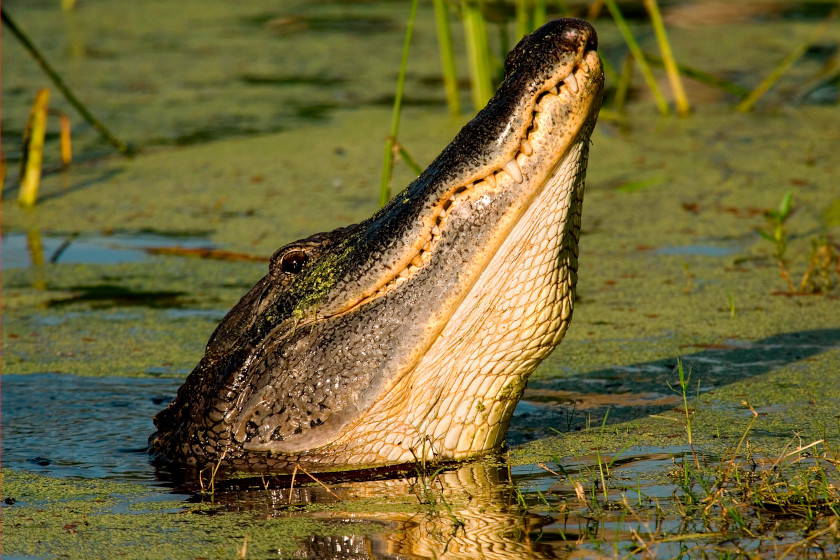
PaulWolf via Getty Images
The Lone Star State has plenty of gators to go around. Hunters are required to have a resident or non-resident hunting license. Texas also requires hunters to get a CITES Tag (Convention on International Trade in Endangered Species) Tag. The state divides seasons by "core" and "non-core" counties. There are some interesting wrinkles to the regulations, so pay attention to how Texas Parks and Wildlife classifies the county you wish to hunt. Texas only allows alligators to be taken from private property. They can be harvested from public waters, but only if the hunter and any used devices are on private property at the time.
Hunters in Texas can use hook and line setups and can set lines out overnight. The TPWD has a 300-pound test line requirement and these lines must be checked daily. Gigs, snares, and archery gear are all legal. As expected, Texas is wide open on the firearms you can use. The only exception is they don't allow rimfire for gators, which we wouldn't recommend for their thick hides anyway. Also legal for use are airguns and bowguns (arrow guns), although we're not sure anyone has used either for gators before.
Non-core counties have an open season from April 1 through June 30. Core counties have a more traditional season that runs September 10-30. Check with the TPWD's full list of areas to see which one your county falls in.
Hunters who harvest an alligator in a non-core area are also subject to mandatory check-in. TPWD also requires these hunters to attach an alligator hide tag report and pay a $21 hide tag fee.
Alligators are a challenging, dangerous, and exciting species to pursue. And a big one will fill your freezer to bursting with delicious meat easily. Good luck to all the alligator hunters heading out this season!
